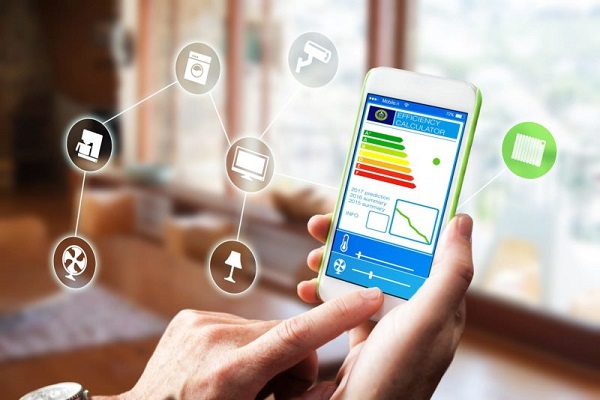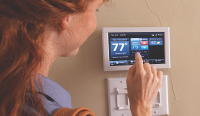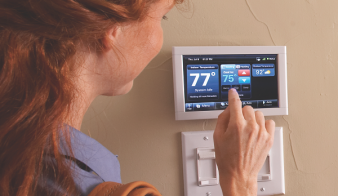Homeowners in the United States are becoming more inclined to update their residences with the latest smart home technology. Smart homes are the homes of the future and come fully equipped with a range of interconnected devices to offer benefits to the average homeowner. Smart voice assistants, smart kitchen appliances, smart home security systems, and Read more
Smart Home Technology

Homeowners in the United States are becoming more inclined to update their residences with the latest smart home technology. Smart homes are the homes of the future and come fully equipped with a range of interconnected devices to offer benefits to the average homeowner.
Smart voice assistants, smart kitchen appliances, smart home security systems, and smart HVAC systems are examples of smart home technologies that homeowners are looking to adopt. It shouldn’t come as a surprise, considering how technology has developed over the years and how the consumer market is becoming more tech-savvy.
As American homes are evolving, how will the role of technicians change? Will technicians learn new skills or technologies to earn business from homeowners? Below is more information about smart home technology and how the role of technicians may change in an interconnected digital era.

Smart Homes Becoming More Commonplace
Statista estimates that the number of smart homes will increase and surpass the 350 million mark by 2023.
Many big tech companies, including Apple, Samsung, Google, and Amazon, are releasing new smart home technologies for customers. Smart TVs, sound systems, voice assistants, security systems, lighting systems, and thermostats are some examples of popular smart home technologies.
Homeowners reap a handful of benefits by using smart home tech. Convenience is likely the primary benefit – most smart home tech can be controlled by one device, usually a smartphone or tablet. These internet-enabled devices connect to hubs or applications for ease of use.
Impact of Smart Home Technology on the Role of Home Technicians
Because so many homeowners are equipping their homes with smart technology, this will likely change, if it hasn’t already, how home technicians do their jobs.
Typically, smart home technology does not have to be maintained or repaired as often as traditional home technology. For example, most systems will alert homeowners in advance of a breakdown, and some will even help homeowners troubleshoot issues.
However, because smart home technology has complex inner workings, technicians may have more difficulty completing repairs. Higher-end equipment often requires more skilled technicians to handle these types of repairs, or those with knowledge of proprietary systems.
What Technicians Need to Know
It will be crucial for technicians specializing in home maintenance or repairs to educate themselves and understand how basic smart home technology works. Service technicians will have to learn how these home devices connect and how each device functions to diagnose and repair issues.
Beyond working on smart technologies within customers’ homes during repairs, technicians may need to rely on these technologies for their own operations. For example, technicians might employ the use of electronic signatures to fuel their business and close deals more efficiently. Or, they may use wearables to capture and improve upon connected data like inventory and location information.
One major reason technicians will need to become more knowledgeable about smart home tech is that homeowner expectations are changing. A technician who has expanded their skillset to repair smart home tech will be in higher demand than those who do not.
As smart homes go mainstream, technicians capable of working on these complex smart home technologies will be well-positioned to offer their repair services, allowing their business to grow and generate more revenue.
Technicians: Keep Your Skills Relevant in the Age of Smart Home Technology
All technicians need to stay up-to-date with the latest technologies. Whether they specialize in HVAC, lighting, or plumbing, modern technicians should be aware of the adoption of smart home technologies to better prepare themselves for these repairs.
 Guest Blogger: April Miller is a managing editor at ReHack.com who specializes in engineering and construction technology. You can find her work published on sites like Open Data Science and The Society of Women Engineers.
Guest Blogger: April Miller is a managing editor at ReHack.com who specializes in engineering and construction technology. You can find her work published on sites like Open Data Science and The Society of Women Engineers.

It’s easy to become overwhelmed when thinking about the Internet of Things (IoT) and the complexities of smart home appliances and products. However, it’s never too late to educate yourself on the smart HVAC features and products that are sought by today’s customers. Before the dawn of the smart age, HVAC controls were synonymous with Read more
It’s easy to become overwhelmed when thinking about the Internet of Things (IoT) and the complexities of smart home appliances and products. However, it’s never too late to educate yourself on the smart HVAC features and products that are sought by today’s customers.
Before the dawn of the smart age, HVAC controls were synonymous with a simple thermostat that provided comfort from a system designed to focus only on heating or cooling a space. Functionality and practicality were the most vital roles of an HVAC system. With the increased role that technology plays in our daily lives, a lot has changed.
It’s no secret that smart home technology has reshaped the way consumers interact with their homes on a day-to-day basis. Now more than ever, consumers demand the ability to change their home’s climate with the push of a button or a simple voice command – without ever touching the thermostat and from anywhere, whether sitting on a couch or away on vacation. The focus has gone from practicality to the accessibility and convenience that come with an integrated smart HVAC system. Simply put, consumers demand more from their HVAC systems.
 Considering this smart home revolution, technology advancements have allowed for HVAC systems to evolve faster than can be absorbed by those in the field who must explain the functionality of the systems they are selling. How can one fully learn and understand the value of today’s smart HVAC? Dedicated time to learn about this rising tide of technology is important, but equally as helpful is to install and use similar HVAC-connected smart products within your own home. First-hand experience and determining how it can benefit your life will simplify explaining the value proposition to customers.
Considering this smart home revolution, technology advancements have allowed for HVAC systems to evolve faster than can be absorbed by those in the field who must explain the functionality of the systems they are selling. How can one fully learn and understand the value of today’s smart HVAC? Dedicated time to learn about this rising tide of technology is important, but equally as helpful is to install and use similar HVAC-connected smart products within your own home. First-hand experience and determining how it can benefit your life will simplify explaining the value proposition to customers.
While the smart home revolution has markedly changed the products, services, and accessibility HVAC dealers can offer, making the sale comes back to the homeowner’s perceived financial outlay and return on investment. Knowing how to explain the value in energy savings and diagnostic capabilities throughout the life of the product can help make the case for the more costly, higher efficiency system. Similarly helping consumers understand the value of convenience from a connected systems, such as voice interactions through Alexa, or even Geofence-based set points through the app, are paramount to moving customers up to a connected system.
It also provides an avenue to become a trusted advisor for your customers while building lifelong relationships for not only yourself, but also for the brands you’re selling. While a robust consumer value proposition is key to making the initial sale, the long term value to a contractor of a connected customer is even more impactful. Using remote diagnostic capabilities, servicing dealers can better maintain the customer relationship over time, deliver more efficient service when required, and be in the best position for a proactive replacement at the end of the product lifecycle.
By being transparent and showcasing factors such as energy savings, user experience, cross-device capabilities, etc. dealers can leverage the smart home revolution to position themselves as knowledgeable and trustworthy.
Because smart home technology has reshaped the way HVAC systems are viewed within the greater home ecosystem, it should be noted that not everyone (or every home) is right for a smart HVAC installation. Consumers often do their own research before consulting dealers about whether a technologically advanced HVAC system is right for their home. In the end, an educated consumer can be the best barometer for whether upgrading to a smart HVAC system makes the most sense.
 George Land, Connected Home Solutions General Manager for Ingersoll Rand Residential HVAC
George Land, Connected Home Solutions General Manager for Ingersoll Rand Residential HVAC
